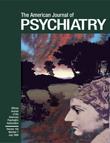Dr. Bagby and Colleagues Reply
To the Editor: James Reich, M.D., M.P.H., contends that the only way to assess the effects of depressed mood on the self-report of personality traits is to use longitudinal designs. We disagree. Statistical analyses and methodological designs that incorporate multiple methods in the measurement of personality can provide strong inferential evidence in determining the clinically significant effects of depressed mood on personality traits. In this regard, two findings from our study warrant reiteration.
First, depressed patients’ self-reports of personality did not differ from informant ratings even when the informants were specifically instructed to rate these patients as they are usually. Thus, one method of assessment presumed to be influenced by the state effects of depressed mood (self-report) did not differ from a method of assessment (informant ratings) presumed to be not so influenced. The fact that the informants reported being cognizant of the fact that depressed mood does affect in some way a patient’s personality suggests that they were able to set aside these potential effects when specifically instructed to do so. Dr. Reich suggests that this very recognition is verification of the effects of depressed mood on personality. Dr. Reich fails, however, to appreciate the distinction between the influence of depressed mood on personality traits and the accurate assessment of premorbid traits, despite the presence of depressed mood. Most valid measures of personality traits—for example, the NEO Personality Inventory—consist of items that are intended to elicit traits, not states. The data from our study suggest that these questions measure mostly traits (see also reference 1).
The second point to reiterate is that while there were some marginal differences between the self-report ratings and the informant ratings, as determined by standard statistical tests of significance (i.e., t tests), the magnitude of these differences, as determined by the effect size (i.e., Cohen’s d), was not clinically meaningful. Dr. Reich did not address this issue in his reinterpretation of the results from our report. This point is best exemplified from the results of an earlier study conducted by our group (2), which examined the differences between acutely ill and fully recovered depressed patients. Although the acutely depressed patients had significantly higher neuroticism and significantly lower extraversion scores than the recovered patients, scores for both patient groups remained in the clinically significant range. Thus, the clinical interpretation for the test scores of the recovered and nonrecovered patients would not change. Finally, it is instructive to note that of the four studies cited by Dr. Reich in support of the position that depressed or anxious mood influences personality traits, not one of them calculated effect sizes or otherwise ascertained the clinical significance of statistical differences.
1. Santor DA, Bagby RM, Joffe RT: Evaluating stability and change in personality and depression. J Pers Soc Psychol 1997; 73:1354–1362Google Scholar
2. Bagby RM, Joffe RT, Parker JDA, Kalemba V, Harkness KL: Major depression and the five-factor model of personality. J Pers Disord 1995; 9:224–234Crossref, Google Scholar



